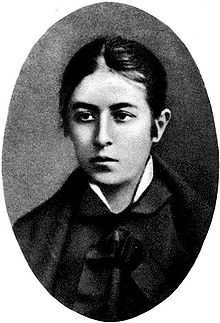Vera Figner
| Vera Figner | |
|---|---|
 Vera Figner circa 1880 | |
| Born |
July 7, 1852 Kazan Governorate, Russian Empire |
| Died |
June 15, 1942 (aged 89) Moscow, Soviet Union |
Vera Nikolayevna Figner (Filippova) (Russian: Ве́ра Никола́евна Фи́гнер (Фили́ппова), July 7 [O.S. June 25] 1852 – June 15, 1942) was a Russian revolutionary and narodnik born in Kazan Governorate, Russian Empire.
Biography
Vera Figner was the oldest of six children of a wealthy forester. When she was eleven she was sent to the Rodionovsky Institute for Women in Kazan for the following six years. When she returned to her rural home she was influenced by her liberal uncle, and began to aspire to help the poor. She decided to study medicine, which was not permitted for women in Russia at the time, in Switzerland. Figner's father forbade her from going, so she married Alexei Filippov, saved money and sold her dowry, and traveled to Zurich.[1]
From 1872-1875, she was a student of Department of Medicine at the University of Zurich. In 1873, Figner joined the Fritsche circle, which was composed of thirteen young Russian radical women, some of whom would become important members of the All-Russian Social Revolutionary Organization. She had trouble reconciling her new political view of herself as a parasitic member of the gentry with her previous view of herself as a good, innocent, person. A directive banning all Russian women students from remaining in Zurich was published in the Government Herald, accusing them of using their medical knowledge to perform abortions on themselves, in 1873.[1] Most of the Fritsche decided to return to Russia and spread socialist propaganda among the Russian peasantry, but Figner decided to remain in Switzerland to finish her studies. In 1875, Mark Natanson told her that the Fritsche desperately needed her help in Russia. She returned to Russia that year without getting her degree, but found herself unable to help the circle and so got a license as a paramedic and divorced her husband. A year later became one of the separatist narodniks (Yuri Bogdanovich and others among them), who had been siding with Zemlya i volya.
Figner took part in the Kazan demonstration in St.Petersburg in 1876. From 1877-1879, working as a doctor's assistant, she conducted revolutionary propaganda in the villages around Samara and Saratov. In 1879, Figner took part in the Voronezh Congress of Zemlya i volya (Land and Liberty). After the split of Zemlya i volya in 1879, she became a member of the Executive Committee of Narodnaya Volya (The Will of the People), conducting propaganda activities among intelligentsia, students and military in St.Petersburg, Kronstadt and southern parts of Russia. Figner took part in the creation of the paramilitary wing of Narodnaya Volya and its activities. She participated in planning the assassination of Alexander II in 1880 in Odessa and in 1881 in St. Petersburg. After the successful assassination attempt on the tsar on March 1, 1881, Figner conducted revolutionary activities in Odessa. Being the only member of the Executive Committee left in Russia, she tried to resurrect Narodnaya Volya starting in 1882, which had been eliminated by the police.
Arrest and exile
As a result of the betrayal by Sergey Degayev, a police informer who had infiltrated her circle, Figner was arrested at Kharkov, on February 10, 1883 and a year later sentenced to death, during the Trial of the Fourteen. The sentence, however, was commuted, through the intercession of Niko Nikoladze, to perpetual penal servitude in Siberia. She spent the 20 months before her trial in solitary confinement at the Peter and Paul Fortress and was then imprisoned for 20 years at Schlüsselburg. In 1904, Figner was sent into internal exile to the Arkhangelsk guberniya, then Kazan guberniya, and finally Nizhny Novgorod. In 1906 she was allowed to go abroad, where she organized a campaign for political prisoners in Russia. She spoke in different European cities, collected money, published a brochure on Russian prisons translated into many languages. From 1907-1909, Figner joined the Esers, but left the party after the Azef scandal. In 1915 she returned to Russia.
Post-revolution
After the October Revolution (she never accepted the way it had happened), Figner published her book called Memoirs of a Revolutionist ("Запечатлённый труд"), which is still considered one of the best examples of the Russian memoir genre. The book made her famous worldwide and was translated into many languages. Figner was also a member of the Society of the Former Political Prisoners and Exiles (Обществo бывших политкаторжан и ссыльнопоселенцев). She took active part in a magazine called Katorga and Exile ("Каторга и ссылка"). Figner authored a number of biographies of several narodniks and articles on history of the Russian revolutionary movement from the 1870s-1880s.
References
| Wikimedia Commons has media related to Vera Figner. |
- ↑ 1.0 1.1 Five Sisters: Women Against the Tsar, eds. Barbara A. Engel, Clifford N. Rosenthal, Routledge, 1975, reprinted in 1992, ISBN 0-415-90715-2
|